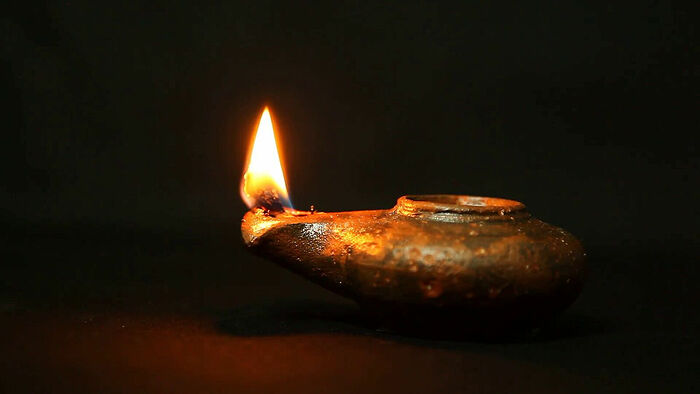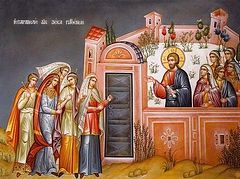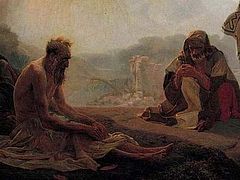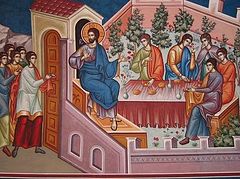Dear brothers and sisters, we have passed through the arena of the Holy Forty Days and entered upon the greatest days of the holy passion of Christ. The days of this Passion Week are called great because in these days God accomplished His ineffable and great works for the salvation of mankind. The Lord gave mankind great gifts in these holy days. In these holy days, death is abolished together with the devil’s torments; God is reconciled with men, Heaven is opened, and man is united with the angels.
These ineffable gifts and mercies of God towards us sinners impose upon us the duty to be worthy of our calling and our salvation accomplished by the Lord. The Church cares about our salvation and with its hymns and Gospel readings it awakens us, our sleeping souls, and warns us to be ever spiritually vigilant. At Matins we heard the wondrous hymn: “Behold, the Bridegroom comes at midnight, and blessed is the servant whom He shall find watching; and again, unworthy is the servant whom He shall find heedless. Beware, therefore, O my soul, do not be weighed down with sleep, lest you be given up to death and lest you be shut out of the Kingdom. But rouse yourself crying: Holy, holy, holy, art Thou, O our God. Through the Theotokos, have mercy on us.” This hymn is based on the parable of the Lord where He likens the Kingdom of Heaven to ten virgins who, according to ancient custom, took their lamps and went out to meet the Bridegroom (Mt. 25:1-13). Let us briefly explain this Gospel story.
The Holy Fathers interpret this parable saying that the ten virgins, of which five were wise and five were foolish, refer to us Christians, some of whom are wise in their faith, virtuous life, and readiness for death, while others are foolish in their lack of faith or coldness, their indifference to faith, their depraved carnal life, their unpreparedness for death and the judgment that follows immediately after it: As it is appointed unto men once to die, but after this the judgment (Heb. 9:27).
As it says, the foolish virgins took their lamps but without taking any oil with them. What are these lamps and what does the oil for these lamps mean? The lamps are our souls. The oil is alms, according to St. John Chrysostom, or good deeds in general. Thus, the foolish Christians who came out to meet the Bridegroom hadn’t prepared any good deeds for their souls that could support their spiritual lives. The wise virgins, it’s said, took oil in vessels with their lamps; that is, they stored up good deeds so as to worthily meet the Bridegroom.
Who is the Bridegroom? Jesus Christ. When and how do we go out to meet Him? Our entire life must be a preparation first for a personal encounter with Him, because every soul must come to answer to Him after death as to the author of life; and therefore our entire life must take care to acquire and preserve living faith and fervent love for the Lord in our hearts, that after our death we may appear without shame or condemnation at the dread throne of the Lord of glory. We will go out to meet Him together after our resurrection from the dead, when all who are in the tomb shall hear the voice of the Son of God… And shall come forth; they that have done good, unto the resurrection of life; and they that have done evil, unto the resurrection of damnation (Jn. 5:25, 29).
The Bridegroom tarries (Mt. 25:5), that is, Jesus Christ is slow to cut off our lives with death, not willing that any should perish, but that all should come to repentance; in the same way, He tarries with His second glorious and terrible coming in order that the sons of the Heavenly Kingdom might multiply more and more. Meanwhile, deceived by the fleeting sweetness of sin, and seeing that it goes unpunished, and seeing that the world stands firmly and thinking it will stand thus forever, people who enjoy strong health and other material benefits sink into spiritual slumber, neglect the amendment of their lives, and sleep the sleep of sin. But then in the very midst of this sleep of sin, when none of the sinners are even thinking about the terrible danger, a loud voice rings out: Behold, the Bridegroom cometh; go ye out to meet Him (Mt. 25:6). Then all lit their lamps, that is, they tautened their spiritual attention.
It will be good at that time for wise Christians—their souls will burn with the fire of the sweetest love for God. But it will be bad for the foolish Christians—their souls, like lamps without oil, will go out; that is, they will darken and cool from the lack of love for God, the source of love, and will begin to experience a foretaste of the torments of hell. They will ask for oil, that is, for good deeds from the wise Christians, but these latter won’t give them so that they themselves not be found wanting in them; so they will go to buy from those who sell, that is, they will come to their senses and remember that they have to do good deeds and will go to seek an opportunity to do so, but then the Bridegroom will come; that is, just when they want to do good deeds, death will overtake them, and will stand them, stinking of iniquity, without any virtues, before the Heavenly Judge…
From the book, Homilies, Archimandrite Kirill (Pavlov), Holy Trinity-St. Sergius Lavra, 2006




